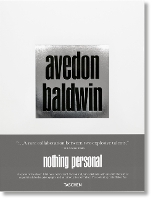|
books
| book details |
Nothing Personal
By (author) Richard Avedon, By (author) James Baldwin

|
This book is currently unavailable. Enquire to check if we can source a used copy
|
| book description |
In 1964, Richard Avedon, at the time the world’s most famous fashion photographer, and James Baldwin, a leading literary voice in the black struggle in America, col laborated on a searing portrait book, Nothing Personal. This controversial classic from the heart of the American civil rights movement explores the contradictions and extremities at the heart of the American experience, and is especially timely in the age of Donald Trump. Avedon’s subjects range from intellectuals, politicians, a former slave, newlyweds, preacher Billy Graham, pop singers, and civil rights activists, shot in his signature formal and graphic black and white, often tightly cropped. The collection is all the more poignant through its bold and deliberate juxtaposition of specific images, such as Jewish gay poet /Vilen Ginsberg placed opposite the American Nazi Party. Avedon’s work with mental asylum patients, shot in a grainy documentary style, is equally harrowing, although he chooses to end Nothing Personal on a hopeful, positive note, with images of children and parents reveling in the Californian ocean. The photographs are complemented by Baldwin's four-part polemic: a critique of a society that he feels is unjust, alienating, divisive, ancf therefore in the midst of an existential crisis. In a highly personal and pertinent testimony, Baldwin openly writes about his own experience of harassment by a racist policeman on the streets of New York. Designed by Marvin Israel, Nothing Personal is also an art-directed triumph from the Mad Men era. An “oversized†book in its own white slipcase, the minimal and striking placement of images and text alike revolutionized the packaging of photography books. This is a meticulous reprint of the original, which has long been out of print, produced in close collaboration with the Richard Avedon Foundation. A 72-page accompanying booklet features never-before-seen outtakes, contact sheets, portraits of the authors at work, preliminary layouts, correspondence, ephemera, and an essay by Baldwin expert and Pulitzer Prize winner Hilton Als. Als traces the making of Nothing Personal and documents the personal and creative relationship between Avedon and Baldwin, who were high school friends in the 1940s. Als also movingly reflects on how Nothing Personal impacted his own life, as well as his friendship with Avedon. When published, Nothing Personals dark, disturbing vision of America inevitably divided critics, and Avedon in particular endured harsh criticism. Some felt that a fashion photographer had no place in dabbling in social commentary, while others found his book to be an elitist statement by New York liberals, unrepresentative of the true feelings of “real†Americans. Sound familiar?
| product details |
Normally shipped |
Publisher | Taschen GmbH
Published date | 25 Oct 2017
Language | Spanish
Format | Paperback / softback
Pages | 0
Dimensions | 360 x 270 x 0mm (L x W x H)
Weight | 0g
ISBN | 978-3-8365-6956-9
Readership Age |
BISAC | photography / subjects & themes / portraits
| other options |
|